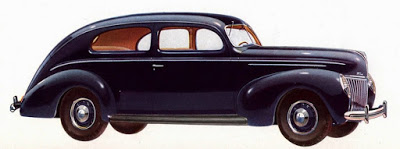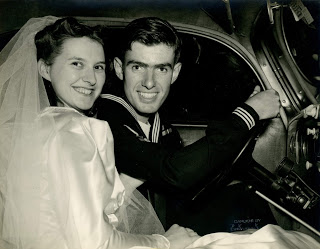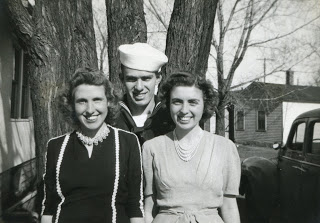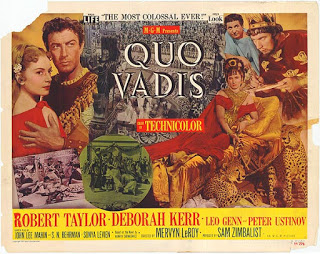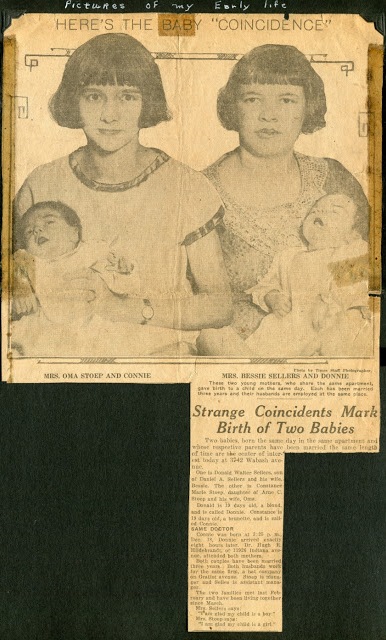Part 1Part 2
THREADS OF LOVE
by Raymond C. Jensen
XI
Our first few weeks together as an extended family had run relatively smooth. But during the latter part of January, on a Friday afternoon, a series of events began that we’ll long remember.
On that particular Friday, Priscilla had been doing her weekly ironing. Having come to a stopping place, she unplugged the iron and set it on the back of the kitchen counter. For some reason she went upstairs and while there, the phone rang. It was a call from her mother. As she and her mother were talking, she smelled something burning. Becoming alarmed, she quickly ran downstairs to see what was wrong. Much to her surprise she discovered that the iron had been plugged into an outlet near the floor and then placed over a handkerchief on the coffee table. The iron had become hot enough to not only burn through the handkerchief, but badly scorch the veneer top of Richard’s coffee table. After assessing the damage, Priscilla talked to the younger children about the incident and Scott admitted to leaving the iron on the table. We could only guess that he had observed Priscilla doing the ironing and wanted to help his mother out. He evidently left the iron when it became too hot to handle, not realizing the danger of fire. To this day, I marvel that a little boy of only twenty-two months could not only find a way of reaching the iron, but knew how to plug it into an outlet. Anyway, we were just thankful that he wasn’t burned in the process. As for Richard’s coffee table; I seem to remember that we were able to get the top refinished.
The following day was Saturday. I seem to remember that Dick and his family had gone out for the day. Unfortunately, I had come down with the flu and was of little help with the children. Because I was ill, Priscilla decided to do the weekly grocery shopping after the children had gone to bed. By nightfall I still wasn’t feeling very well, so Priscilla fed the children their supper and got the younger ones settled into their beds. Then, after borrowing my car keys (we only had one set) she got into the car and took off for the Red Owl store near our house. By the time she had finished her shopping, her cart was so full that the cashier needed nine grocery bags to contain it all. Not only that, it cost a total of eighteen dollars! Of course, if it hadn’t been for the meat and vegetables in our freezer, it would have cost even more. At any rate, after the carryout boy stowed the bags into the rear of our station wagon, Priscilla headed for home, relieved that her shopping was done for another week. When she got home she pulled up in front of the house because it was easier to carry the groceries in the front door than in the back. Just happy to be home, she stepped out into the street. Then, without thinking, she pushed the lock down and slammed the door shut. Instantly she knew that she had locked the keys in the car. Panicky, she ran around to the other side of the car, hoping that the door wasn’t locked, but it was and so was the tailgate. Of course, it could have happened to anyone, but knowing that I was sick and would have to get out of bed into the cold in order to break into our car caused her to feel even more guilty. I’m sure that I must have groaned when she told me what had happened. But I knew that we couldn’t leave all those groceries (including milk and eggs) in the car all night. Dressing as warmly as I could, I gathered some tools together and ventured out into the cold January night. Fortunately, the car was parked near a street light so I could see what I was doing. I don’t remember if I tried the coat hanger routine or not, but if I did, it didn’t work. I considered breaking a window but finally decided to force the small vent window open instead. I seem to remember that I was able to remove the pin from the top hinge and wedge the window open enough so I could reach in and unlock the door. Needless to say, I was thankful to retrieve our keys and get back into a warm bed. I don’t remember how the groceries got into the house, but perhaps Richard had come home by then and helped Priscilla carry them in. Anyway, I’m sure that at the very first opportunity we had an extra set of car keys made.
Sunday morning, I felt better, but not well enough to go to Sunday School and Church. After talking it over, Priscilla and I decided that it would be best if she took the four oldest children with her and left the two youngest boys home with me. Because she got a late start, Priscilla decided to take a less traveled route (27th Street) to church. As she approached Grand Avenue, she saw that a car had stopped for the through-stop sign on the north side of the intersection. Because she was traveling on a through street, Priscilla naturally assumed that he would wait for her. But just before she entered the intersection he pulled out in front of her, seemingly unaware of her presence. Instantly she jammed on the brakes but to no avail. The streets were slippery and there was no avoiding the collision. The impact was enough to render our car undriveable and his vehicle somehow ended up against a telephone pole. Instead of getting out of his car to see if Priscilla and the children were hurt, he shouted through his car window, “Are you all right?” She responded with, “I think so!” Then, much to her amazement, he backed away from the pole and took off. Fortunately, she had enough presence of mind to get his license number and a neighbor called the police. When the police arrived, she gave them his license number and told them what had happened. Because he had left the scene of the accident, the police surmised that he had been drinking.
I’m not sure when Priscilla got to call home, but when she did, Richard answered the phone. As soon as he heard the bad news, he called a tow truck for our car. Then after explaining the situation to me, he drove to the scene of the accident to pick up Priscilla and the children. Amazingly so, none of them were injured, and at Priscilla’s request, he took them all to church. I was thankful that they were all O.K., but felt badly about not having been with them when they needed me the most.
Because the other driver had left the scene of the accident, the police filed a charge against him for failing to stop and give his name. I’m not sure when the court proceedings took place, but on the day of the hearing, the defendant’s lawyer petitioned the court to change the charge to “failing to give name.” When the Judge asked Priscilla if the defendant had stopped, she said, “He had to. He hit a telephone pole!” Evidently the Judge was satisfied that he had stopped and fined the defendant $10.00 on the lesser charge of “failing to give name”. Priscilla remembers that the other driver was visibly shaking during the entire time and didn’t say a word at his hearing.
The repairs to our car came to $600.00. Because it was an intersection accident, the defendant’s insurance covered only half the cost. Fortunately, our insurance covered the balance. The defendant never filed a claim against our insurance company for his damages. Perhaps his lawyer advised him against doing so.
By Monday morning I felt well enough to go back to work. But without a car, I knew that I’d have to take the streetcar. Fortunately, Richard’s workplace was near mine, so he offered to drop me off at work. Needless to say, I was grateful. Having been sick, the thought of standing out in the cold waiting for the streetcar was anything but appealing. I seem to remember that Richard couldn’t pick me up after work because of a difference in our work schedules. At any rate, I decided to take the streetcar home.
As expected, Richard got home from work before I did. Knowing that I would be late, Priscilla went ahead with the usual pattern of having dinner as soon as one of us came home. In the process of fixing dinner, Priscilla had put a Pyrex tea pot of water on the stove to heat. By the time the water was boiling, dinner was ready to be served and she turned off the burners on the stove.
 |
The Jensens
back: Mark, Steven
middle: Ray Grant, Priscilla
front: Scott, Todd |
As Richard helped the younger children get seated at the table, Barbara put Todd in his high chair and pulled it out away from the end of the stove where it was normally kept when not in use. Before sitting down, Priscilla always moved Todd closer to the table so she could feed him. But on this night, before she even had a chance to move him, he suddenly reached out with his right arm and put a finger into the spout of the tea pot. Somehow, he tipped the pot enough so the scalding hot water ran down the inside his T-shirt and onto his chest. Aghast at seeing her baby in such pain, Priscilla’s first impulse was to remove Todd’s T-shirt. In the process, part of his skin peeled off, causing her to become even more alarmed. Fortunately, Richard had the presence of mind to call the doctor who advised them to take Todd to the emergency room immediately. Since Richard had to stay with the children, Priscilla had no other choice but to use her brother’s car. Having just had an accident the previous day, she was hesitant about driving a car that she wasn’t used to but knew that there was no other way.
After Priscilla carefully wrapped Todd in a blanket, she and Barbara hurried out to Richard’s car, just grateful that it was still warm. As Barbara held Todd in her arms, Priscilla headed for Swedish hospital, driving in sleet conditions and on icy streets until they finally reached their destination. Thankful that they had arrived safely, Priscilla took Todd into her arms and, with Barbara close behind her, rushed into the emergency room exclaiming that her baby had been burned. Immediately the doctor and nurses sprang into action. As they examined Todd for the extent of his burns, Priscilla explained in detail what had happened. Because his right arm and upper body had been badly scalded, it was necessary for Priscilla to restrain Todd’s arm so they could work on the burned areas. She remembers that she had only the tip of his middle finger to hold onto as they treated his burns and applied the bandages. After they had done everything possible to help him, the nurses took Todd to his room. I think it was then that the doctor talked to Priscilla about Todd’s chances of recovering. He told her that it wasn’t the burns but the shock to his system that could be fatal and that he couldn’t promise her anything. Before leaving, Priscilla peeked into Todd’s room and to her dismay saw that they had restrained him in his crib in a spread-eagle fashion. Angry at what she saw, she went out to the desk and told them that Todd hadn’t even learned to turn over yet and that there was no need to tie him down in that manner. Realizing this, the nurse was happy to oblige and untied Todd. I think they were just doing their job and were fearful that he might turn over and aggravate the already painful burns.
Sometime before Priscilla and Barbara left for home, the nurse told Priscilla that it would be better for Todd if we didn’t come to see him. In their experience, they had learned that children of that age became overly upset when parents came to see them and then left. While the thought of not being able to see our baby seemed cruel at the time, we didn’t want to do anything that might hinder his recovery. We just had to assume that because of their experience they knew what was best.
That night when I got home from work, Richard met me at the door. In a calm voice he told me what had happened to Todd and that Priscilla and Barbara had taken him to the emergency room. I think that he was trying to do his best not to unduly alarm me. Had I known how serious things really were, I would have been far more anxious. As it was I had no idea of the seriousness of Todd’s burns and may have even thought that the hospital would release him after they had treated his burns.
When Priscilla and Barbara returned from the hospital, Priscilla filled us in on everything that had taken place in the emergency room. Needless to say, I now understood the full gravity of the situation and was thankful that Richard and Priscilla had acted in such a decisive way.
Had they waited for an ambulance to come, it could have been too late. As I look back at this incident, I cringe at the very thought of our baby being burned in this way. But at the same time, I feel the greatest admiration for my wife, who at a time of near tragedy, kept her head and did what had to be done.
In the days to come, Todd held his own and gradually showed signs of improvement, for which we were all thankful. Priscilla remembers anxiously calling every day to check on his progress. Because Todd was a good patient, the reports were encouraging but due to the severity of his burns, healing was slow. Finally, after thirty days of waiting, we were told that he was well enough to be discharged. Excited at the prospect of seeing our baby again, we hurried to the hospital and found him lying on pillows in an old-fashioned wooden wheelchair. He was waiting at the nurses’ station and they told us that because he was so good, they often kept him out there in order to keep them company.
In spite of his long hospital stay, Todd’s burns were far from being healed. Before we left the. hospital, the nurse instructed Priscilla how to bathe him in Dreft and then apply the Vaseline and gauze bandages to the affected areas. For the next two months, Priscilla faithfully followed the nurse’s instructions until finally the last of the unhealed areas had become completely healed over with new skin.
When we took Todd in for his checkup, our doctor was pleased with his progress. However, because of the scar tissue, he said that Todd might need plastic surgery on his arm when he became a teenager. He explained that in the event of a rapid growth period, the scar tissue could cause problems. Fortunately, that period never occurred, and his growth pattern remained gradual all the way to maturity.
About the same time that Todd had recovered from his burns, Scott had his tonsils removed. We were thankful that it was finally taken care of because he had suffered from tonsillitis ever since November. Dr. Meyer hadn’t wanted to remove the tonsils before Scott was two years old because he thought they might grow back again. In the meantime, he had kept Scott on penicillin to ward off any infection.
XII
About two months after Connie had died, Richard came home from work one night and found a calling card from a woman named Mona, a parish worker at Bethlehem Lutheran Church. Curious about what she wanted, he called her on the telephone and introduced himself. In response, Mona explained that her pastor was a friend of his pastor and that Richard’s pastor had told them about Dick losing his wife to polio. She went on to say that because she had also lost her spouse to polio, her pastor suggested that she call on Richard. At any rate, as a result of the telephone conversation, they agreed to get together at Mona’s house the very next night.
On the night that they met, they talked about the things that had impacted on their lives since losing their spouses. Perhaps they shared their pain and frustrations as well. I can only guess that being able to talk to someone who understood what they had gone through was beneficial and perhaps even therapeutic. Nevertheless, they made no plans to meet again.
 |
| The site of that fateful meeting |
Sometime in December, Richard had left his two boys with a friend so he could take his daughter Jeanne to the Hasty Tasty restaurant for lunch. When they walked in, he was surprised to see Mona and her son having lunch with a friend. Not wanting to be unfriendly, they went over to their table to say hello. After returning Dick’s greeting, Mona introduced Dick and Jeanne to her roommate, Charlotte Thompson, who also had her son with her. Later, when Mona and Char had finished their lunch, they stopped at Dick and Jeanne’s booth and continued their conversation. Having a common bond of widowhood between them, the three of them hit it off well and, before leaving, they invited Dick to come over and visit them sometime.
During the month of January Dick decided to take Mona and Char up on their offer and called them to see if it was O.K. for him to come over. Their answer was “yes,” and after putting his children to bed, Dick got into his car and headed for their house on York Avenue and 43rd Street. When he arrived, he was greeted in a warm and friendly manner that instantly made him feel at ease. During their conversation Dick learned that Mona and Char laughingly referred to themselves as the Merry Widows because they lived in a dwelling that housed five widows. As the evening progressed, the three of them spent time becoming better acquainted. Being widowers with little children, I’m sure that they had many things in common to talk about.
Richard obviously enjoyed Mona and Char’s company that night because from that day on he made frequent trips to the house of the Merry Widows. He remembers that during his visits, they had many interesting conversations and discussions together. Included in these discussions from time to time, was another widowed friend of Mona and Char. Her name was Merlyn, and on occasion, she would stop over to visit them. On the nights that both Merlyn and Dick were at their house, Mona and Char would often suggest that Dick give Merlyn a ride home. For some reason they were hoping that the two of them might become interested in each other. But after Dick had taken Merlyn home, he always came back to their place… obviously not interested in Merlyn other than as a friend.
One of the subjects that often came up for discussion was about getting married again. Dick remembers that Char was very emphatic about not wanting to change her son’s last name in the event that she were to remarry. Richard, on the other hand, felt that if he were in a similar situation, he would have to insist on all of the children bearing his name. Of course, their discussions on marriage were all speculative because none of them were seriously considering marriage (at least at this time). As for Char, she felt that even if she had wanted to get married, she never would have considered Richard because he was too short!
For the next few months Dick continued to enjoy his visits with Mona and Char… and occasionally Merlyn. However, he thought of their relationship as strictly one of good friends and not as having any emotional ties.
As time went on, Char began to realize that her interest in Dick had become more than casual. But because she was unsure of how he felt, she didn’t feel free to make her feelings known. I can only guess that Dick had become attracted to her as well, but had difficulty coming to grips with his feelings.
Sometime during the first week of May, Dick surprised Char by calling her at work. He wanted to know if she was free on May 8th to go out with him to see the Martin Luther film. Needless to say, she was thrilled at the prospect of going out on a date with Dick and said “yes.” On the appointed day and hour Dick stopped to pick up Char at her house. Having looked forward to a good time together, both of them were in an expectant mood as they drove to the theater. The film began at 8 p.m. and by the time it was over, the hour was late. Nevertheless, at Dick’s suggestion, they stopped at the Rainbow Cafe for a treat. Char doesn’t remember what she ordered, but remembers that she had a taste of the malted milk that Dick ordered. As they lingered over their treats, just talking, they realized how much they had enjoyed being with each other. But as always, time went by much too quickly and soon they had to get back to Char’s place. When they arrived, they discovered that somehow they had been locked out. Not wanting to awaken Mona, Dick looked around for a way to get in and found an open window through which he could enter the house. Once inside he was able to unlock the front door and let Char in.
[Note: You can read Char’s memories of this time here.]
Having had such a romantic evening together, neither of them wanted to part company. Instead, they sat close to each other just talking about things that were important in their lives. Perhaps it was during these moments that they felt a special oneness of spirit that they hadn’t felt before. In the glow of the moment, Richard turned to Char and asked her to marry him. While totally unexpected, Char knew that this was right and without any hesitation said “yes.” I can only imagine the sublime joy and peace that they must have felt at the moment. Once again, their lives would be complete and no longer would they have to suffer the loneliness and separation that they had felt for so long. As they continued to bask in the joy of their new-found relationship, Dick kissed Char and then softly sang the words of a popular love song that expressed his feelings for her.
Before parting, they decided that for the time being, they would keep their engagement a secret. However, they made one exception; Char could tell Mona. The next morning Char could hardly wait to tell her friend the good news. But when she told her what had happened, Mona thought that Char was only kidding. She simply couldn’t believe that Dick would have proposed marriage on their first date! After a half hour of friendly persuasion, Char finally convinced Mona that their engagement was for real. Needless to say, Mona was happy for both of them.
For the next few weeks Char and Dick continued to see each other. Sometimes the two of them talked late into the night. Because Dick didn’t want to disturb the neighbors when he left, he parked his car at the end of the block on top of a hill. Then on the nights that he left late, he simply shifted his car into neutral, gave it a nudge and silently rolled downhill until out of earshot of Char’s neighbors. At that point he’d start the engine and head for home.
Sometime in June Dick began to have second thoughts about their engagement and told Char that he thought things were moving too fast. Having been widowed for almost two years, Char was emotionally ready to get married again. But when Dick said, “You’re not Connie!” she understood.
 |
| Char & Warren Thompson |
Char remembered how it was for her the first year after her husband Warren had died so suddenly from a brain hemorrhage. Not only that… she was left four months pregnant. At any rate, rather than have misgivings later, both of them decided that it would be best if they discontinued dating for a while.
In the meantime, Dick began to counsel with his pastor. He was having mixed feelings about getting married so soon after Connie had died. I think that in part, his struggles were out of loyalty to Connie’s memory. But he was also concerned about what his family might think… and this was especially true of Grandma Libby. Over the years Grandma had always made it clear that she thought widowers should wait at least a year before getting married again.
After counselling with others and sorting through his feelings, Richard decided that what he really wanted to do was to marry Char and make a home for their children. As a result, they began to date again. Only this time, they made their engagement public by telling their family and friends about their good fortune. I seem to remember that Char and Dick’s first priority was to visit his mother and tell her about their engagement. They also drove to Northfield to see Char’s mother, Mrs. Hovick, in order to tell her the good news. Dick remembers that when he met Mrs. Hovick, the first thing she said to him was “You’re no Shrimp!” Evidently Char had previously told her mother that Dick was too short for her. Anyway, from that day on Dick and Char’s mother hit it off famously.
Now that the good news of their engagement had been made public, Char and Dick were free to set the time of their wedding. Because Mona and Char’s lease on their apartment was up in mid-August, Dick and Char chose August 15th as their wedding day. Coincidentally, this was also Grandma Libby’s birthday, something that pleased Grandma immensely. Knowing that we would be moving back to the house on Bloomington Avenue before Char and Dick were married, we gave our renters a month’s notice so they would have time to find another place to live.
This was a busy and exciting time for Char and Dick. Among other things, Char remembers that on the day that she took Jeanne out to buy her a new dress for the wedding, Jeanne told the saleslady that her Mom and Dad were getting married! Knowing that Jeanne already thought of her as “Morn” must have made both Char and Dick feel especially good. Char also remembers that during this period of time, Mona got married to a pastor who had been interning at a church in Mankato, MN. For some reason, she couldn’t join him immediately, so she continued to live with Char until sometime in July.
XIII
In the latter part of July, all six of our children (but not Dick’s) came down with something that resembled the flu. But because they got over it so quickly, we didn’t give it a second thought. Just a couple of days later Steven became ill again, as if he was having a relapse. I think this happened on a Saturday. At any rate, on Sunday afternoon he said that he was hungry, and Priscilla fixed him a peanut butter sandwich. I seem to remember that he was only able to eat a quarter of the sandwich, but because he had trouble swallowing, it took him a long time to get it down. We assumed that the problem was caused by a sore throat and hoped that by morning he’d feel better. On Monday morning Steven’s voice sounded strangely different, unlike anything that we had heard before. Realizing that he might have something more serious than the flu, Priscilla called Dr. Meyer at his office. When he heard about the difficulty that Steven had swallowing and how strange his voice sounded that morning, he said that there was no doubt about it being polio. The only question was what kind. Then he told her to take Steven to General Hospital and have him admitted. In spite of what had happened to Connie, we had had no idea that Steven might have polio! But once we knew, we became deeply concerned. The memory of Connie was still fresh in our minds!
After Steven was admitted he was taken to his ward by a nurse. But because polio was so contagious, we weren’t allowed to accompany him to his room. Nor were we able to visit him at any time during his stay at the hospital. The epidemic had become so wide-spread that people were fearful for their children… and rightly so. In addition to Connie and Steven, Priscilla’s 26 yr. old cousin in Zumbrota had contracted polio and was completely paralyzed from the neck down. (She still lives to the day and depends on a lung machine in order to breathe.) There were others as well. Some friends at our church had a son Steven’s age who also had polio and was left with both legs paralyzed. In addition to this, one of the Club girls had a baby daughter who was left with a paralyzed shoulder. (I mention these only to give the reader a feel for the times.)
The day after Steven was admitted to the hospital, we were called and informed that Steven had Bulbar polio. Since this was the kind that Connie had died from, the news did anything but allay our fears. However, from then on we received good news regarding his progress, for which we were exceedingly grateful. Unlike many other children with polio, he became only partially paralyzed in his throat and left side. During the latter part of the same week, we went to General Hospital for gamma globulin shots. The doctor at the Hospital had strongly advised that all of the children and Priscilla (because she thought she might be pregnant) be given the shots. Gamma globulin contained antibodies that they thought might be effective against certain microorganisms in polio, measles and infectious hepatitis. The dosage depended on the weight of the individual and, in the children’s case, meant a single shot in the hip. Richard had the foresight to bring a bag of chewy candy along and after each child had gone through his or her ordeal, he put a piece into their mouths. I’m not sure that it eased their pain, but it probably gave them something else to think about. Priscilla was given her shots last. The pregnant nurses who had received shots in their hips had experienced such discomfort that the doctor decided to break up Priscilla’s dosage into four shots… one in each arm and hip. On the way home, her hands became numb as a result of the injections in her arms. Knowing that she wouldn’t be able to fix dinner, Priscilla asked us to pick up chow mien instead. Later that evening, Priscilla called the hospital to ask what to do about the numbness in her hands. They told her to soak in hot water, but it was to no avail. By the morning, her fingers were so bad that she couldn’t handle the pins in the babies’ diapers. Frustrated by her inability to even change the babies’ diapers, she called the hospital and told the doctor how disabled her hands had become. His response was anything but helpful! He said, “I’m so glad you called. You were a test case. We won’t do that again!” Priscilla’s numbness did gradually go away, but in retrospect, I can’t help but wonder why they hadn’t warned Priscilla in advance about what to expect.
I think it was around the third of August that we received a phone call from General Hospital. It was the doctor, and after introducing himself, he said “How are you, Mrs. Jensen?” Priscilla’s response was “We’re busier than cranberry merchants. My brother is getting married and we’re in the process of moving back to our old house.” (The phrase “cranberry merchant” was one that Priscilla’s Grandma Libby often used.) Knowing how anxious we were to see Steven again, the doctor facetiously said, “Then you won’t have time to pick Steven up and take him to Sister Kenny’s!” Of course, Priscilla knew that he was kidding and said “We’ll be right there!”
 |
| Sr. Kenny Institute, 1800 Chicago Avenue, Minneapolis |
Dropping everything, we immediately left for the hospital, excited at the thought of seeing our son again. He had been in the hospital for nine days and we were anxious to see for ourselves how he was doing. When we picked Steven up he was all smiles, just bubbling over with joy. As we started to drive, he said something about how glad he was to be going home. All of a sudden it hit us! He hadn’t been told that he was going to Sister Kenny’s for therapy! When we tried to explain why he couldn’t go home at this time, he clammed up and wouldn’t talk to us. Realizing how terribly disappointed he was, we tried to cheer him up but to no avail. He remained glum all the way to the Sister Kenny Institute! I seem to remember that he did reluctantly say goodbye to us when we left. I felt badly about leaving our son… almost as if we were deserting him! However, knowing that he was on the road to recovery and that we would be able to visit him soon, made it all bearable.
We were glad when Sunday rolled around. Having left Steven in such an unhappy state of mind, we hoped that he would be over his disappointment and that he would be pleased to see us. Upon arriving at Sister Kenny’s, we were directed to the children’s ward and then shown to his bed. Needless to say, we were elated to find him in a cheerful mood and doing well in spite of the crowded conditions. Because there were so many children that needed therapy, the cribs had been placed end to end with just enough space between rows to accommodate nurses and week-end visitors. In addition to this, the room had become unbearably hot from the August heat. Fortunately, the children were better able to withstand the heat than we adults.
As we visited with Steven, I couldn’t help but notice that some of the children were unable to move their limbs as they laid helplessly in their cribs. It was a depressing sight and one that I viewed with mixed emotions. I felt exceedingly sorry for these little ones, but at the same time, thankful that Steven had escaped with only minor paralysis.
Just a little over seven months from the time that we had moved in with Richard, our family moved back to Bloomington Avenue. Because we now had a third bedroom (the one the Grandma Libby had lived in), it was no longer necessary for us to sleep in the dining room. In many ways it was good to be back. We were closer to our parents as well as my work place. In addition to this, we had less than block to walk to church.
On August 15, 1953 numerous friends and relatives gathered together at the Northwestern Lutheran Seminary Chapel in anticipation of Char and Dick’s wedding. The ceremony was supposed to be at 4:00 p.m. But because the mothers’ corsages had inadvertently been left at Char’s house, the ceremony was held up while Mona’s husband went back to get them.In the meantime, the organist continued to play as the time for the ceremony came and went with still no sign of the wedding party. By this time, Grandma Libby had become unduly concerned and, in a very loud whisper, was heard to say, “I wonder if they’ve changed their minds!” Fortunately, the wedding party did show up, and Grandma was much relieved to see that everything was all right.
 |
| Mona (the matchmaker), Char, Dick, Howard |
Char remembers that they were served communion during the ceremony, a fitting way to start a new life together. Because many of their guests had suffered with them through their bereavement, the wedding was not only an emotional time but one of great joy.
 |
| The reception at St. Andrew’s |
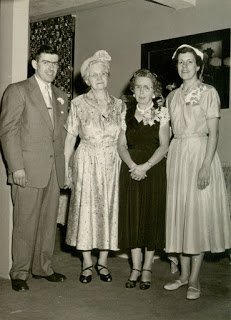 |
The Mothers’ Corsages!
Dick, Pauline Hovick, Grace Lohman, Char |
After the wedding, a reception was held at the St. Andrew’s Lutheran Church on 49th Street and York Avenue. During the time of fellowship, a supper was served and pictures taken of the bride and groom with their children. Present among the guests were the children’s five grandmothers… the mothers of Richard, Charlotte and Warren (Char’s first husband), plus great-grandmothers Libby and Stoep.
 |
back: Grandma Helland (Connie’s grandmother), Grace Lohman (Dick’s
mother), Pauline Hovick (Char’s mother), Agnes Libby (Grace’s mother)
middle: Dick, Gustav Lohman (Dick’s father), Paul, Mabel & Charles
Thompson (Warren’s parents) holding Chuck, Char
front: Doug, Jeanne |
Having previously made arrangements for their children to stay with friends and relatives, Char and Dick left on a week’s honeymoon right after the reception was over. When they returned, they took time to visit Steven at Sister Kenny’s. Sometime during the same period of time, my brother Bob visited him as well. I remember that Bob brought Steven something to work on in order to pass the time of day.
 |
| Sr. Kenny at work |
Sister Kenny was an Australian nurse who had developed a treatment for polio. Unfortunately, her treatment methods weren’t accepted in her own country. Because of this, she came to the United States where she found a more receptive climate for her methods. At the time, the medical profession believed that the polio victim could only be helped by using braces to immobilize the afflicted limbs. Sister Kenny’s treatments, on the other hand, were simple and effective. She used a combination of moist heat and passive exercise. But equally important to the process was the participation of the patient. Priscilla remembers that two weeks after Steven had undergone therapy, the nurse told us that he would have to learn to do certain exercises before he could be released. Priscilla thought that he would never be able to do them because none of our other children could. (She had had the other children try to do the exercises.) But because he wanted to go home so badly, Steven worked all the harder, and just thirty days after he had entered Sister Kenny Institute, he achieved his goal. Words alone can hardly describe how happy we were when Steven came home with us. We were thankful that he showed no signs of muscle atrophy in his limbs, and that he was left with only slight paralysis of his throat. All in all, the world seemed a better place to be. We had missed Steven’s cheerful presence, and now he was home in time for us to celebrate his seventh birthday. Once again, our family was complete.
▂ ▂ ▂
When the idea of writing a story about this segment of our lives first came to me, I thought it would be an easy task. I soon found out differently. As I wrote, I became emotionally involved, sometimes to the point of tears. In searching for a title, I’ve looked for a common thread that ran throughout the story. I discovered that what really mattered wasn’t the bitter or sweet experiences that we encountered, but the threads of love that bound us together and continues to bind us together to this day.
“So Faith, Hope and Love abide, these three;
But the greatest of these is LOVE.”
I Corinthians 13:13
 |
| Char & Dick, Russ & Muriel, Priscilla & Ray… and all of those cousins!
|



























